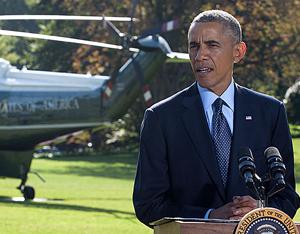It’s Time for Global Powers to Unite Together and Eradicate ISIS Terrorist Group

President Obama gives a statement in regards to the airstrikes against ISIS.
Sept. 11, 2014 marked the 13th year anniversary of one of the greatest tragedies in American History—an affront to not only the U.S., but to the principles of liberty and equality we so openly embody. But this year, Sept. 11 came with more than just chilling memories of Al-Qaeda. President Obama, in an internationally broadcast speech, announced America’s reallocation of time and resources to “degrade and ultimately destroy” the terrorist group ISIS (Islamic State of Iraq and Syria). The threat posed by ISIS is unique in scope and unlike anything we have faced to date. After the ill-thought approach to Iraq during the Bush Administration—sending soldiers based on false premises with no real exit strategy—it is crucial for our leaders to discuss and debate the externalities which could result from their decisions.
ISIS was originally an Al-Qaeda affiliate in Iraq but has since defected and become even more radicalized and extreme. Alienating all other Muslims, ISIS seeks to establish an Islamic State enforced by unparalleled cruelty and social dissonance. It is important to note that their interpretation of Islam—a religion promoting peace—is convoluted, and that the people most directly terrorized, subjugated, and slaughtered are real Muslims in that region. ISIS is not new—it has existed for over a decade, but it has only recently gathered enough strength to seize prominence on the world stage. Taking advantage of a destabilized Iraq and government bereft of any unity or real legitimacy, the self-proclaimed caliphate has seized a region spanning from the city of Monsul to western Syria employing brutality intolerable to any humanitarian with a set of morals.
A four-pronged plan has been highlighted by the current administration in an effort to confront ISIS: 1) a sustained and systematic air-strike campaign; 2) increased support to domestic anti-ISIS forces fighting on the ground; 3) bolstered intelligence and counter-terrorism efforts to thwart any encroachment towards the west; and 4) continuing and widening humanitarian aid to the displaced and victimized population of innocent Iraqis.
The 2nd point presents perhaps the greatest area for dispute, and rightfully so. The anti-ISIS forces referenced are so called “moderate rebels” that are, in some cases, also radicalized jihadists. Cooperating with these groups could create a false sense of security. There is no telling where their allegiances will lie in the wake of a power vacuum once ISIS has been destroyed. We can only hope that the very arms we provide for them will not be used against us in the future.
Since the end of World War II and adoption of America’s role as “policeman of the world,” a pattern has appeared in our military strategies. The black and white days of “good guys” and “bad guys,” if you will, are long gone. What we see now, more than ever, are various shades of grey. We are now torn between the “bad guys,” who we are forced to tolerate, versus the “even worse guys,” who have openly declared their wish to destroy all of western civilization. More and more do we question our role as guardians of the world and come to grips with the fact that we are not invincible, that we alone cannot stop this great evil from spreading.
However, there is still hope. With lessons learned from failures in Iraq and prudent action taken boldly and decisively, together, allied with our friends, global powers, and credible groups in the Middle East, we possess the strength to eradicate this twisted regime from the face of the earth.










